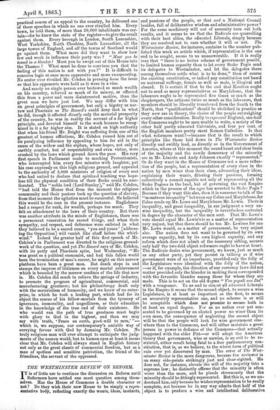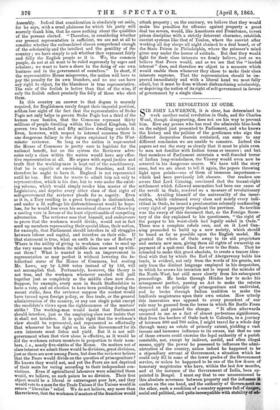THE WESTMINSTER REVIEW ON REFORM.
TT is of little use to continue the discussion on Reform until Reformers have settled one moot question among them- selves. Has the House of Commons a double character or not ? Do they wish their new House to be simply a repre- sentative body, reflecting exactly the wants, ideas, instincts, and passions of the people, or that and a National Council besides, full of deliberative wisdom and administrative power? For the same machinery will not of necessity turn out both results, and it seems to us that the Radicals are quarrelling with their best allies, the educated Liberals, simply because they are resolved not to care whether it will or not. The Westminster Review, for instance, contains in the number pub- lished this week an article which, if representation is the one end to be sought, seems to us unanswerable. If it is really true that " there is no better scheme of government possibl. to limited human capacity than to let every Stoke Pogis send its delegates to Westminster, and let the delegates there among themselves settle what is to be done," then of course the existing constitution, or indeed any constitution not based on universal suffrage, female as well as male,.is illogical and absurd. It is certain if that be the end that Honiton ought not to send as many representatives as Marylebone, that the labourers ought to be represented five times as much as the shopkeepers, the artizans twice as much as the labourers, that members should be liberally transferred from the South to the North, that "qualifications" should be abolished in practice as they now are in theory, the choice of the people outweighing every other consideration. Really to represent England, one-half the Commons ought to be men unable to write, a moiety of the other half partly educated Calvinists, and four per cent. of the English members pretty stout Roman Catholics. Is that what reformers want ?—because that is the result to which principles like those laid down in The Westminster Review directly and swiftly lead, as directly as in the Government of America, where at this moment the sound heart and clear brain of the majority and the rowdy democracy of the minority are in Mr. Lincoln and Andy Johnson exactly " represented." Or do they want in the House of Commons not a mere reflec- tion of the people, but a representation of every class in the nation by men wiser than their class, advocating their ideas, explaining their wants, filtering their passions, forming collectively a council capable not only of representing all the Stoke Pogises in the land, but of governing the vast Empire which in the process of the ages has accreted to Stoke Pogis ? Because if they want this also, then it is nonsense to talk of the "monstrous inequality" between say Caine and Marylebone, for Caine sends up Mr. Lowe and Marylebone Mr. Lewis. There is inequality, and great inequality, in our judgment a very un- wise inequality, but the inequality is nevertheless corrected in degree by the character of the men sent. That Mr. Lowe's vote should equal Mr. Lewis's is as a matter of representation very unjust, but that there should be ten Mr. Lewises for one Mr. Lowe would, as a matter of government, be very unjust also. The nation does not want to be governed by its own average capacity, but by its own highest capacity, and any reform which does not admit of the necessary sifting, secures only half the two-fold object reformers ought to have at heart. The Radicals desire wise government, we know, just as much as any other party, yet they persist in talking as if wise government were of no importance, provided only the folly of the Legislature were identical with the folly of the nation, —as if, for example, the direction of our currency laws did not matter provided only the blunder in making them corresponded with the favourite blunder among those for whom they are made. This is to act on the old dogma " Vox populi vox Des"' with a vengeance. To us and to almost all educated Liberals in the Empire it seems that the second object, to secure a wise Legislature, is at least as important as the first, to secure an accurately representative one, and no scheme is or will be acceptable which does not promise to secure both in at least an equal degree. For as no nation ever yet con- sented to be governed by an elected power no wiser than its own mass, the consequence of neglecting the second object will be that the people will look for wise government else- where than to the Commons, and will either maintain a great person in power in defiance of the Commons—that actually happened with the elder Pitt—or will adopt the American theory that government, wise or unwise, is an evil to be re- stricted, either result being fatal to a free parliamentary con- stitution, that is, as we believe, to the wisest form of political rule ever yet discovered by man. The error of The West- minster Review is the more dangerous, because the reviewer is on many side-points strikingly just and clear-sighted: He does not, for instance, elevate the will of the majority into a supreme law ; he distinctly affirms that the minority is often wiser than the mass, and he pleads strenuously that the minority should be fittingly represented. But this is, as we un- derstand him, only because he wishes representation to be really complete, not because he in any way admits that half of the object is to produce a wise and intellectual deliberative
Assembly. Indeed that consideration is absolutely set aside, for he says, with a cruel plainness for which his party will scarcely thank him, that he cares nothing about the qualities of the persons elected. " Therefore, in considering whether our present representation is sufficient, we are not at all to consider whether the enfranchised classes comprehend enough of the scholarship and the intellect and the gentility of the country ; we have simply to ask whether they represent fairly and fully the English people as it is. We, the common people, do not at all want to be ruled supremely by sages and scholars; we want to have a share in the doing of our own business and in the government of ourselves." In short, if the representative House misgoverns, the nation will have to pay the penalty for its own blunders, and no one can have any right to object, for the blunderer is true representative. The rule of the foolish is better than that of the wise, if only the foolish reflect precisely the folly of those who elect them.
In this country an answer to that dogma is scarcely required, for Englishmen rarely forget their imperial position, seldom lose sight of the fact that the representative of Stoke Pogis not only helps to govern Stoke Pogis but a third of the human race besides, that the Commons represent thirty millions of people dwelling within the United Kingdom, but govern two hundred and fifty millions dwelling outside it. Even, however, with respect to internal concerns there is one dangerous fallacy in the dogma explained by The West- minster reviewer. So long as the nation is represented the House of Commons is pretty - sure to legislate for the national benefit, but on the system the Reviewer advo- cates only a class within the nation would have any effec- tive representation at all. He argues with equal justice and truth that the working-man is kept out of the constituency, that he is capable of exercising the franchise, and that therefore he ought to have it. England is not represented until he has. But then he wants to admit him not only to representation, which is his due, but to vote under the exist- ing scheme, which would simply render him master of the Legislature, and deprive every other class of that right of self-government the reviewer pleads for so eagerly. Even as it is, a Tory residing in a great borough is disfranchised, and under a 5/. suffrage his disfranchisement would be hope- less, for he would lose even his occasional chance of throwing a casting vote in favour of the least objectionable of competing adversaries. The reviewer sees that himself, and endeavours to prove that the workmen would divide, would not in fact send up members representing their special ideas, their notion, for example, that Parliament should interfere in all struggles between labour and capital, and interfere on their side. If that statement is true, what on earth is the use of Reform ? Where is the utility of giving to workmen votes to send up the very same men whom the middle class now send up with- out them ? What is wanted is such an improvement in representation as may perfect it without lowering the in- tellectual status of the House of Commons, but seating Mr. Lowe, say by 5,000 votes instead of by 150, will not accomplish that. Fortunately, however, the theory is not true, and the workmen whenever excited will pull together just as completely as the middle class now does. Suppose, for example, every man in South Staffordshire to have a vote, and an election to have been pending during the recent strike, does the reviewer suppose the contest would have turned upon foreign policy, or free trade, or the general administration of the country, or any one single point except the candidate's views upon the righteousness of the masters' strike ? The working-man would insist that Parliament should interfere, just as the employing class now insists that it shall not interfere. It is quite right that the workman's view should be represented, and represented so effectually that whenever he has right on his side Government for its own interests must listen and yield. But it is not self- government when that view alone is effective, as it would be did the workmen return members in proportion to their num- bers, i. e., nearly five-sixths of the House. On matters not of class interest we admit there would be divisions, great divisions, just as there are now among Peers, but does the reviewer believe that the Peers would divide on the question of primogeniture ? He knows they would not, and yet the Peers are not deprived of their seats for voting according to their independent con- victions. Even if agricultural labourers were admitted there would, we believe, on such points be no division. Their first object would be a liberal or extravagant poor law, and they would vote to a man for the Trade Unions if the Unions would in return " liberalize " relief. We do not believe, any more than thereviewer, that the workmen if masters of the franchise would attack property ; on the contrary, we believe that they would make the penalties for offences against property a great deal too severe, would, like Americans and Frenchmen, invest prison discipline with a strictly deterrent character, establish convict systems like that of Toulon, where the convict after working all day sleeps all night chained to a deal board, or of the State Prison in Philadelphia, where the prisoner's mind gives way under the horror of solitude. But that they would fight for their class interests we firmly believe, just as we believe that Peers would, and as we see that the " landed interest" does, and therefore we object to a measure which would enable them whenever they chose to make their class interests supreme. That the representation should be im- proved immediately and with a liberal hand we most fully admit, but it must be done without disfranchising scholarship, or depriving the nation of its right of self-government in favour- of government by a single class.































 Previous page
Previous page